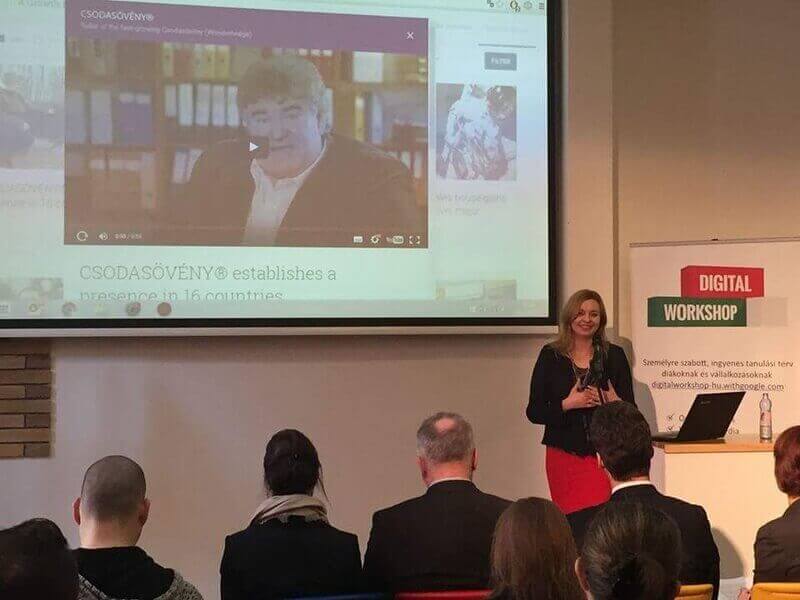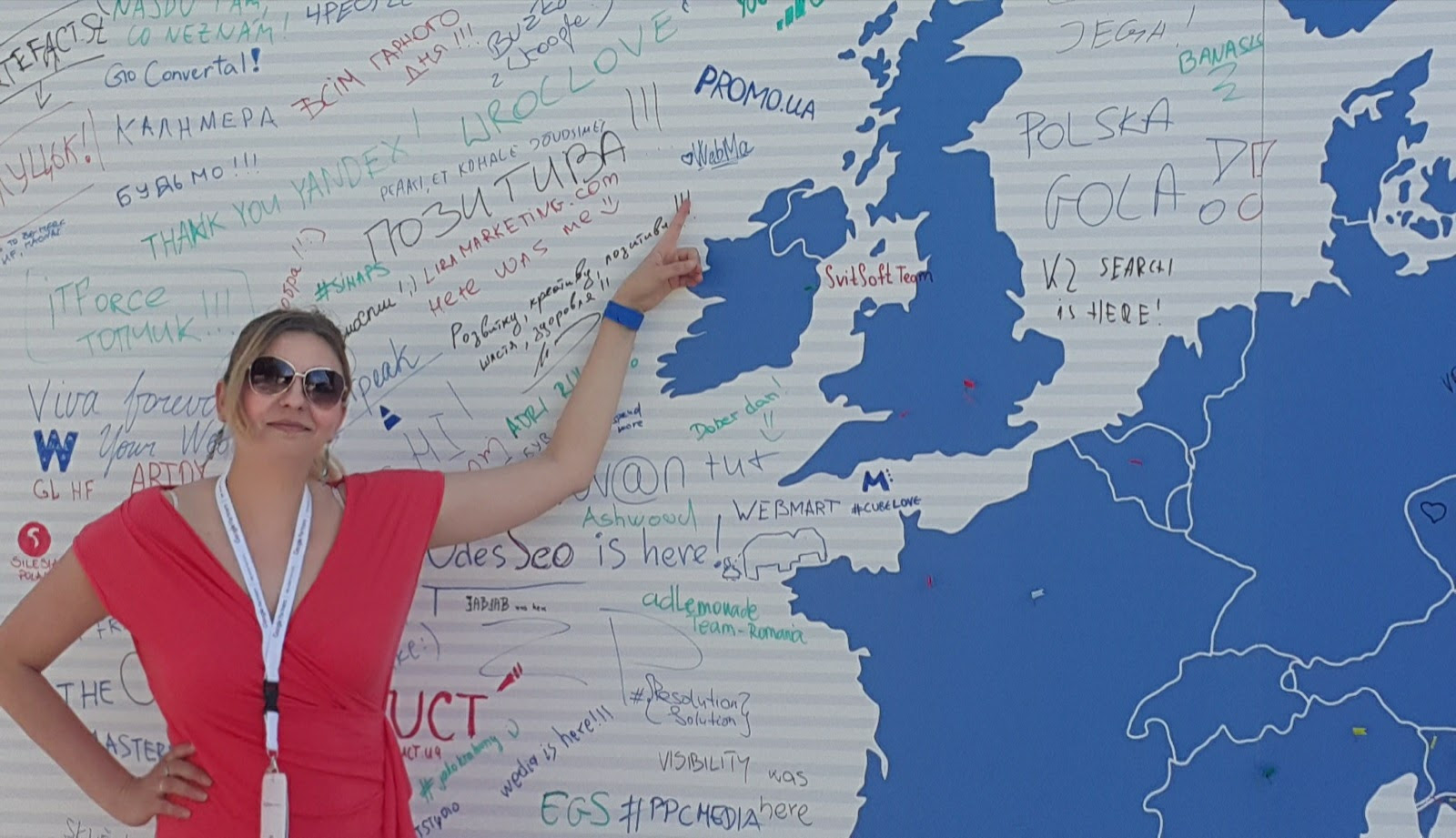 Eva Vajda is the owner and CEO of www.iwebma.com, a Premier Google Partner agency, which offers strategic marketing consulting services for digital marketing, PPC campaigns and Analytics since 2005. In this interview with Eva Vajda, you will learn how the world of digital marketing has changed in recent years and discover tips to attract visitors and users to your website.
Eva Vajda is the owner and CEO of www.iwebma.com, a Premier Google Partner agency, which offers strategic marketing consulting services for digital marketing, PPC campaigns and Analytics since 2005. In this interview with Eva Vajda, you will learn how the world of digital marketing has changed in recent years and discover tips to attract visitors and users to your website.
Tell me the story of your company, how it started and why in 2005 …
The company was established by 3 professionals. Arnold (software architect), Gábor (Ph.D. physicist) and me, who personally come from the traditional media business. The guys had been working together for several years before, so they had tremendous experience in various technology related projects. I was working as a sales and marketing leader of a publishing company, with very long business hours and even more pressure and stress… All of us wanted to create more value and make our own company.
At the beginning we started with our own CMS system, wanted to sell self-service websites, which are user- and Google friendly. Very soon become clear for us, that “being Google friendly” means, that the website is able to generate traffic and business from organic search results and this is the most important feature we should focus on (and we were very soon sure as well, that we don’t want to be one of the many cheap, self-service CMS systems).
Some months later we started to use Google Analytics among the first ones (that time you needed an invitation to create an account…).
In 2006, I got my first AdWords qualification. I was the 2nd or 3rd in Hungary who got this. Since that time AdWords became more and more important among our services (and later Facebook PPC came as well), but our focus haven’t changed much since then: strategic digital marketing consultancy, PPC campaigns, and Analytics.
More than a decade working in digital marketing, that means that you started when almost nobody did it. How has evolution been in marketing over the years?
That’s a tough question because on one hand, almost everything has changed, but on the other hand, I think the main principles, how can you be successful in digital marketing are the same, as 13 years ago.
10-13 years ago, we have bought links from websites with “High PageRank” and checked our PageRank value almost every day… We didn’t have Facebook, Google AdWords was about 90% simpler and less developed system and we had no smartphones.
Nowadays everyone has a Smartphone, we use plenty of social platforms on a daily basis and a new generation grew up, who have already born in the digital age. We have to face new challenges like multichannel tracking and attribution-modeling, personalization, mobile related issues, internet-of-things, voice search, GDPR and many others… But the “substance” of our work hasn’t changed at all: how can we reach, engage and after all “make happy” and convert our potential users into clients or customers? The goal is the same, but our tools, communication channels, and the environment changed a lot. We have a lot more difficult job than before, not just because of the fragmented channels, but because of the much higher user expectations as well. If you want to enter or be successful in digital marketing, you have to invest much more resources in order to achieve your goals than you had to a few years ago – not just on the client side, but also on the agency side as well.
Your slogan is WebMa Analytical Marketing. What does it reflect?
As I mentioned before we had a very strong technological background. We never wanted to be a creative agency – we work with great partners for this kind of tasks – but wanted to focus on the facts and numbers. Analytical marketing means that marketing decisions should be made based on data and information – instead of solely on personal intuition. However, it’s much more difficult in the practice as it sounds… Because data is far not simply information, you have to grab it from numbers and many times happens, that the deeper you grab into the data, the more questions you’ll have…
You are a Premier Google Partner agency, what benefits does it bring to you and your clients?
We are a Premier Partner Google Agency, which is the highest level of partnership you can gain as a Google AdWords agency. This means, that we got access to brand new beta features, special trainings and get direct support from Dublin through our agency manager. Google is a great partner. We get many forms of support from them, from special industry benchmarks to strategic recommendations or even to troubleshooting issues. We work close together with the agency team to maximize the results for our clients.
Besides the product related trainings, we got various kinds of other support and opportunities as well. This spring we were selected for the “Agency of Tomorrow” development program, its goal is to provide special business coaching and training to the top 40 agencies of the CEE region.

How do you help your clients improve their visits and attract users to their website?
It absolutely depends on the clients and their goals. A completely different strategy should be applied in the b2b industry than in a webshop or in a brand awareness campaign. Some clients have previous experiences and data, some are just at the beginning of the digital road. Our mission is always to understand the client’s current situation – goals, resources, market situation – and work on a unique, realistic and effective digital strategy that will provide measurable results and a positive ROI. In most cases, we start with an intensive consultancy/workshop phase in order to be able to create an established strategy. Based on this we can define the required tools, resources and other KPIs, which will be the cornerstones of our future work.
Projects usually include the definition of Buyer Personas, the optimization of landing pages or the whole client website from UX, SEO, content and conversion point of view. When we are sure, that the landing pages offer a unique, valuable and engaging experience for the users – also in mobile devices – and we are able to measure the visitors activity accurately – we start to send traffic to the site, various paid/earned media/ppc campaigns. And this is just the first step on a long, never-ending road of continuous analyses, fine tuning and optimization…
In recent years, many businesses and agencies have emerged around SEO that promise to appear on the first page of Google. Are these promises realistic?
Honestly, it was never realistic! You can’t take any guarantee for this… but it makes no sense, either.
Being first among the organic search results means, that you are the best – better than anyone else – for that specific keyword. It’s really not easy, and if you are “only” on the middle of the first page from 100k or 1M results, you will get 1-digit CTR, it means, that at least 90 from 100 users won’t click on you. Of course, this depends on the AdWords situation as well- how many ads appear above the organic results, but in most cases, you will lose the significant proportion of the market and of the potential customers. Besides this, if you succeed and rank for a few keywords on the first result page, that still means, that c.a. 99% for your potential relevant keywords you won’t be there (and it’s far not sure, that these few keywords would be the best choice for you).
Eva Vajda: “If you do not use paid search ads, you will lose your full market potential, won’t get exact search volume and competitor data, which you get with AdWords”
SEO is very important, but it’s a long-term strategy, you can’t control it directly because your positions are influenced not only by your efforts but that of your competitors as well and how could you influence the second one? (not to talk about the Google algorithm, but this is different question…) So this topic is very complex, but I hope that I could give you some insights, why is it a wrong decision, to focus only on a few keywords. If you do not use paid search ads, you will lose your full market potential, won’t get exact search volume and competitor data – which you get with AdWords – and will achieve a much worst ROI, as if you were use both SEO and Google AdWords tools together.
You have worked with clients from more than 20 countries. This gives you a global vision of the markets and their demands. Are there differences between the customers of each country?
Well, I would say no or, at least, not that way… Every client is different, but their characteristics are much more influenced by their company size, industry, previous experiences in digital marketing and their current market situation as if by their nationality. Especially if they operate on export markets they are competing for the same customers. Of course, there are some cultural differences, what kind of reports or communication channels they prefer, but digital marketing is absolutely a global market, if you know well the rules, the target market and the tools and have at least one common language with your customer, you can provide great services!
However the markets are very different: users can behave very differently, prefer diverse platforms and in some cases a few big players can change the market completely and set new standards. Even regulations and available products, targeting options or features can differ strongly among countries.

What book do you recommend for those who want to delve into digital marketing and Google?
Depends on what is your goal and where you start from. If your goal is to become a digital marketing expert I would rather suggest to watch related Youtube videos and professional blogs, follow relevant Linkedin, Facebook and G+ groups and industry experts.
Our industry is changing so quickly, that by the time a printed book is written the information will be out-of-date. Official Google resources, for example, Youtube channels and blogs are available in every major language and are always the best place to start. Think with Google offers not only trends, insights, case studies, but many useful tools as well. You should first receive and understand the “big picture” and then you have to choose, which specific part of digital marketing would you like to be an expert in and then dive into this topic deeply.
There are plenty of first-class industry blogs and portals – Hubspot, Searchengine -Watch/-Journal/-Land, Smart insights, Econsultancy, Kissmetrics, Marketingland, Avinash Kaushik blog, Analytics Ninja or PPC Hero. I could tell at least 20 more, which I try to follow at least occasionally… You can see: it’s a never-ending story and a mission impossible as well to follow all sources simultaneously… but this is, what I like the most in my job: never boring, always changing and a big challenge!
